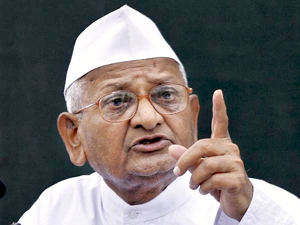 Ralegan Siddhi (Mah), Nov 18: A day after Arvind Kejriwal demanded an open probe into his allegation on spending of IAC funds by Aam Admi Party, Anna Hazare today said he was mainly concerned about "misuse" of his name in poll campaign and maintained the two are "not enemies".
Ralegan Siddhi (Mah), Nov 18: A day after Arvind Kejriwal demanded an open probe into his allegation on spending of IAC funds by Aam Admi Party, Anna Hazare today said he was mainly concerned about "misuse" of his name in poll campaign and maintained the two are "not enemies".
"We are not enemies of each other. Even today I am happy that he is a man of character.... The issue is not of funds. Some delegations told me that SIM cards were issued in my name during the India Against Corruption (IAC) movement, the sale of which led to collection of funds.
"I have no connection in this regard but if somebody files a case then I may be made an accused. This is what I am worried about that without having any connection to it, my name could be dragged," Hazare told reporters.
Hazare statement came after Kejriwal said at a press conference that Hazare had written him on Sunday that he was getting reports of misuse of funds collected for anti-graft movement led by India Against Corruption (IAC), during which the two were together, and his name in the Delhi elections.
Hazare today said he had objected to his name being used in the election campaign by AAP and if Kejriwal wishes to talk to him, he is "ready".
"They say that they will pass Anna Hazare's Janlokpal bill in Ramlila Maidan on December 29. Here again they are using my name and I did not understand that how are they claiming to pass a bill in assembly which can be passed only in parliament," he said.
"I wrote this letter just to seek clarification on these two issues as I felt my name was being misused. I have no interest in the money, just my name should not be misused," he added.
Replying to a question that Kejriwal has asked him to campaign for AAP, Hazare said that he would not engage in the poll campaign for any party. He also said that he has received a reply from Kejriwal, but has not read it yet.
"I have told him that I am ready to talk. I did not know that he wanted to talk. If he wishes so, I am ready to talk," he said.
Hazare had written a letter to Kejriwal saying he had received reports of about using his name in elections campaign, use of fund collected during the anti-graft movement and on implementation of Janlokpal Bill on December 29 after convening an open session at Ramlila Maidan.
Hazare had also questioned his old colleague that he had also come to know that party had collected fund with the help of a SIM card procured in his name.
"I would request Annaji to conduct a through probe by anyone he wants like Justice (retd) Santosh Hedge or anyone else and the report should be made public within 4 8 hours, so neither Congress nor BJP could raise suspicion over funds," Kejriwal had retorted, adding "if I am found guilty I would not contest elections".
"But if I come clean, then Anna Hazare will have to come and campaign for our party," he had said.





Comments
Add new comment